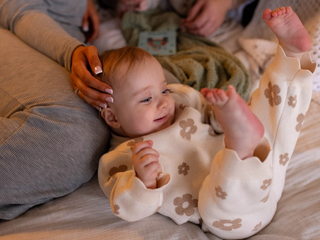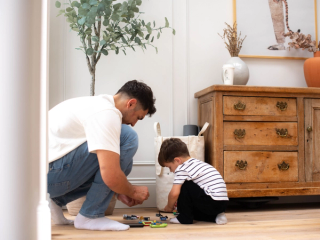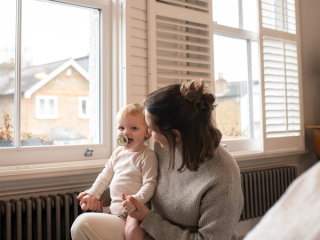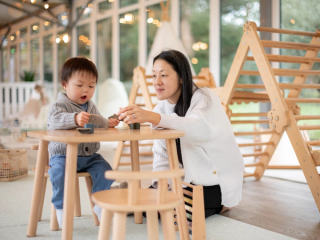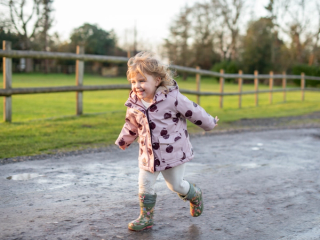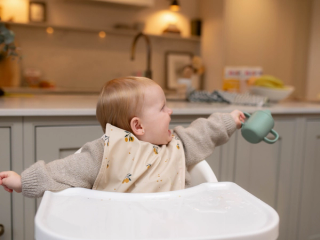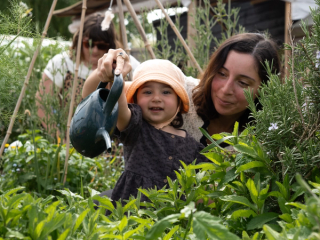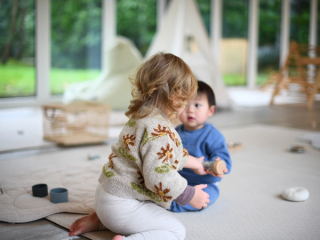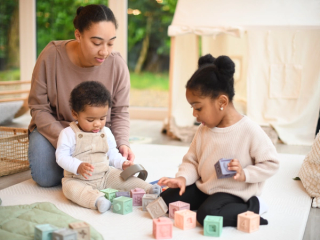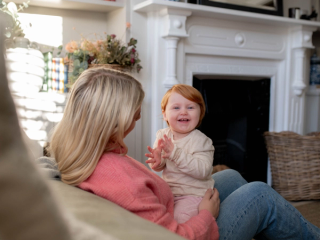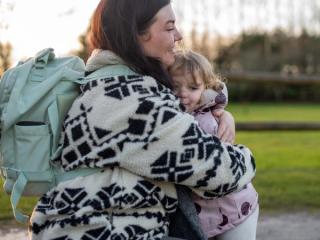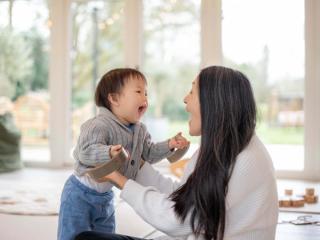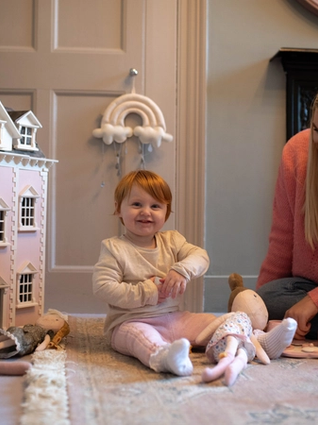
- Home
- Advice Hub
- Toddler
- Toddler Milestones
- The Power Of Play
The power of play: encouraging curiosity and exploration in your toddler
Explore how play fuels your toddler’s development, creativity, and emotional growth. Learn practical ways to nurture curiosity, confidence, and resilience through everyday moments of joyful, meaningful play.
Play. It’s a simple word, yet within it lies the foundation of all learning, creativity, and connection. Play isn’t just what toddlers do – it’s how they are. Every giggle, wobble, and imaginative leap is a vital part of their emotional, physical, and cognitive development.
When we view play through a balanced, compassionate lens like The Behaviour Balance System™ (TBBS), we see it not as a frivolous pastime, but as essential nourishment for the growing mind and heart.
Let’s dive into how understanding the true power of play can transform and nurture your toddler’s curiosity, independence, and resilience.
Follow curiosity, don’t control it
I may have mentioned this several times in many ways and in many places, in fact, I would sing this from the rooftops! Toddlers are natural scientists. They tug, tip, tap, and taste, all driven by a deep-rooted desire to discover how the world works. This exploration is essential, not optional.
Rather than stepping in to correct or redirect, which can escalate behaviour and make you wish you had said nothing at all, we can step alongside our children and join their journey with openness.
It might sound like:
“I wonder what happens if you turn it upside down?”
“Look at how that rolled! Shall we see what else we can roll?”
Science tells us that unstructured play stimulates the part of the brain that allows higher-order thinking (the prefrontal cortex), nurturing skills such as planning, decision-making, and flexible thinking skills. The very act of wondering supports brain connectivity crucial for future learning.
As parents we can promote this development in a number of ways, such as narrating, rather than directing. Through offering observations instead of instructions we can open activities up for further investigation and wonder, fueling our children’s curiosity.
Whilst supporting this process of curiosity, it is also important to allow repetition, as hard as it might feel for us, repeating actions is your toddler’s way of mastering skills, not being ‘naughty’ or ‘obsessive’. Tony Robbins says ‘ Repetition is the mother of all skills’ and this applies to big humans and small. So remember to step into your own curious mind. Stay Playfully Curious, even if you know the answer, wonder aloud with them as it keeps exploration alive. This will help connection and provide a support scaffold for what curiosity might look like - and children need a model.
Create “Yes Spaces” for safe discovery
When toddlers can explore without that constant “no” shadowing their every move, they gain confidence, initiative, and problem-solving skills. This sits hand in hand with our TBBS strategy for ‘turning our no into yes’ which I shared in one of my previous articles.
It might feel like a lot of hard work, but setting up a safe, wonder-rich environment for discovery doesn’t need to be complicated. In fact, you can do it in no time at all!
Here are some TBBS top tips to support you in getting started!
Accessible sensory objects: Keep it all accessible and ready to rock. Think baskets of scarves, safe mirrors, stacking cups, or natural materials like pinecones and smooth stones.
Environmental invitations: Set the environment up to invite your children to engage independently. Low shelves with a few choices encourage independent decision-making.
Rotate, don’t Overwhelm: Too many options is cause for procrastination, destruction and dysregulation. A few well-chosen items are better than an avalanche of toys.
Science tells us that environments that offer safe, open-ended exploration activate a toddler’s sensory systems, supporting neural integration and reducing the likelihood of sensory overload.This not only impacts their ability to play, it also impacts their development, emotional regulation and communication.
Build bonds through shared play
While independent play is important, shared play offers a beautiful gateway for connection, co-regulation, and joy. Children learn endlessly through play so let's set them up for success with social situations through play too!
Joining your toddler's world signals: I see you. I value your ideas.
It might sound like:
“You’re cooking a feast! May I be your guest?”
“Shall we build a house big enough for both our cuddly toys?”
You may also want to start making some simple, yet powerful switches such as:
Instead of: “That’s not how you do it.”
Try: “Ooh, that’s an interesting way! Tell me more about your idea.”
Instead of: “Here, let me fix it.”
Try: “Would you like some help, or would you like to keep trying?”
Remember, play is all about Presence rather than perfection, toddlers don’t need elaborate activities or picture-perfect crafts. They need our engagement, even for just a few minutes of pure, shared silliness.
Embrace boredom and frustration as part of growth
Boredom isn’t a gap to be frantically filled. It’s fertile ground for creativity, letting them sow their seeds of imagination. When toddlers feel ‘bored’, their brains start to spark possibilities. Those moments of 'what now?' encourage innovation, initiative, and imaginative resilience.
You can support the utilisation of boredom in a number of ways. Boredom, like all emotions, fuels action or inaction. By pausing before offering solutions we can allow a minute for your child to invent their own ideas, sparking creativity and getting them into the problem solving process.
With this in mind, have you ever bought an amazing toy, only to find that the box is more interesting to your child? Simple setups (like a cardboard box and a spoon) often unlock richer, more imaginative play than flashing, noisy toys. Our children are naturally imaginative and inventive, providing them with the materials they need is always a great place to start. And don’t forget to celebrate the process! Nothing sparks creativity and connection like focusing on the effort and enjoyment, rather than the ‘end product’. It is not about the game or creation itself, it is about the experience children have along the way.
Science tells us that allowing moments of boredom strengthens the brain’s default mode network, associated with creative thinking, future planning, and emotional regulation. So, crack out the empty boxes, tape and random household objects (safe ones of course) and see what fun your child can create.
Big emotions in play: supporting resilience
As I said, children do not need play to be picture-perfect. In fact, it rarely is, as frustrations bubble up: the tower collapses, the train won’t stay on the track, the cape won’t tie. Rather than rushing to ‘fix’ the problem, we can support emotional growth in these moments. Model curiosity through taking on the challenges.
It might sound like:
“You’re working so hard on that track! It’s tricky, but you’re giving it your best, you are so resilient.”
“It feels upsetting when it doesn't go how you hoped. Let’s take a breath together, we can work this out.”
You can try these simple switches;
Instead of: “Don’t cry, it’s just a game.”
Try: “I see it’s really important to you. I’m proud of how hard you’re trying.”
Instead of: “You’re being silly.”
Try: “Sometimes tricky things make big feelings. I’m here while you figure it out.”
Supporting children through emotional moments in play helps them build persistence, flexibility, and healthy frustration tolerance – skills they’ll carry into school, friendships, and beyond.
Play is personal – and perfectly imperfect
Play doesn’t need to look like anything in particular. It doesn't need to be tidy, logical, or purposeful in adult eyes. That messy splash painting? It is brain-building.
That pile of random objects being a pirate ship? It is problem-solving.
That endless game of “again, again!”? It is emotional security. Let’s celebrate the joy, the effort, and the exploration in its many forms.
It might sound like:
“You’re so creative finding new ways to play with that!”
“I love seeing all the ideas you’re trying!”
Wonder is their superpower
When we honour the magic of play, we don’t just encourage curiosity, we nurture courage, persistence, empathy, and creativity.
Play is how toddlers process their world. It’s how they heal, connect, imagine, and grow. At The Behaviour Bank™, we’re committed to providing practical tools, strategies, and support for parents who want to empower their children’s development through every block tower, mud pie, and dragon dance. Every game, every giggle, every curious question, it’s all growing greatness.
Advice & tips

Want to read more? Join the HiPP BabyClub for full access to this article.
As a BabyClub member, you'll get access to a range of exclusive benefits, including:
Monthly competitions
Discounts from our Partners
Expert advice tailored to your little one's age
Weaning recipes
HiPP shop discounts*
*10% off HiPP's online shop does not apply to our First Infant, Anti-Reflux or Comfort Formula Milk.
Important notice: Breastfeeding is best. Follow on milk should only be used as part of a mixed diet from 6 months. Talk to a healthcare professional.




